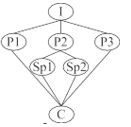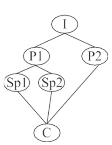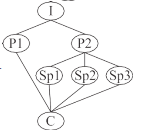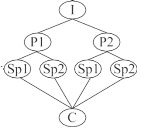One of the greatest sources of unhappiness, in my experience, is the difficulty we have in accepting things as they are.
When we see something we don’t like, we wish it could be different. We cry out for something better. That may be human nature, or perhaps it’s something ingrained (根深蒂固的) in our culture. The root of the unhappiness isn’t necessarily that we want things to be different. However, it’s that we decided we didn’t like it in the first place. We’ve judged it as bad, rather than saying, “It’s not bad or good, and it just is it.”
In one of my books, I said, “You should expect people to mess up and expect things to go differently than you planned”. Some readers said it’s too sorrowful to expect things to go wrong. However, it’s only negative if you see it as negative and judge it as bad. Instead, you could accept it as the way the world works and try to understand why that is.
This can be applied to whatever you do: how other people act at work, how politics works and how depressing the news media can be. Accept these things as they are, and try to understand why they’re that way. It will save you a lot of sadness, because you’ll no longer say, “Oh. I wish bad things didn’t happen!”
Does it mean you can never change things? Not at all. But change things not because you can’t accept things as they are, but because you enjoy the process of changing, learning and growing.
Can we make this world a better place? You can say that you’ll continue to try to do things to help others, to grow as a person, to make a difference in this world. That’s the correct path you choose to take, because you enjoy that path. Therefore, when you find yourself judging and wishing for difference, try a different approach: accept, and understand. It might lead to some interesting results.
1. The author believes that we feel unhappy maybe because ________.| A.it is our natural emotion in the life |
| B.culture asks us to be different from others |
| C.everyone has their own opinions on things |
| D.we dislike something in the beginning |
| A.Acting well at work and in politics. |
| B.Feeling depressed for the news media. |
| C.Accepting and understanding what has happened. |
| D.Saying something negative when bad things come. |
| A.Help others to change the things they hate. |
| B.Enjoy what you have to do in the work. |
| C.Judge yourself and make a wish for you. |
| D.Try a new way when making the world better. |
| A.Accepting can make our life happier and better. |
| B.Expecting things to be different gives us hope. |
| C.Traditional culture becomes root of unhappiness. |
| D.Judging good or bad is important for our world. |
相似题推荐
【推荐1】By now you’ve probably heard about the “you’re not special” speech, when English teacher David McCullough told graduating seniors at Wellesley High School: “Do not get the idea you’re anything special, because you’re not.” Mothers and fathers present at the ceremony — and a whole lot of other parents across the Internet — took issue with McCullough’s ego-puncturing words. But lost in the uproar was something we really should be taking to heart: our young people actually have no idea whether they’re particularly talented or accomplished or not. In our eagerness to elevate their self-esteem, we forgot to teach them how to realistically assess their own abilities, a crucial requirement for getting better at anything from math to music to sports. In fact, it’s not just privileged high-school students: we all tend to view ourselves as above average.
Such inflated self-judgments have been found in study after study, and it’s often exactly when we’re least competent at a given task that we rate our performance most generously. In a 2006 study published in the journal Medical Education, for example, medical students who scored the lowest on an essay test were the most charitable in their self-evaluations, while high-scoring students judged themselves much more strictly. Poor students, the authors note, “lack insight” into their own inadequacy. Why should this be? Another study, led by Cornell University psychologist David Dunning, offers an enlightening explanation. People who are incompetent, he writes with coauthor Justin Kruger, suffer from a “dual burden”: they’re not good at what they do, and their very incapability prevents them from recognizing how bad they are.
In Dunning and Kruger’s study, subjects scoring at the bottom of the heap on tests of logic, grammar and humor “extremely overestimated” their talents. What these individuals lacked (in addition to clear logic, proper grammar and a sense of humor) was “metacognitive skill”: the capacity to monitor how well they’re performing. In the absence of that capacity, the subjects arrived at an overly hopeful view of their own abilities. There’s a paradox here, the authors note: “The skills that lead to competence in a particular domain are often the very same skills necessary to evaluate competence in that domain.” In other words, to get better at judging how well we’re doing at an activity, we have to get better at the activity itself.
There are a couple of ways out of this double bind. First, we can learn to make honest comparisons with others. Train yourself to recognize excellence, even when you yourself don’t possess it, and compare what you can do against what truly excellent individuals are able to accomplish. Second, seek out feedback that is frequent, accurate and specific. Find a critic who will tell you not only how poorly you’re doing, but just what it is that you’re doing wrong. As Dunning and Kruger note, success indicates to us that everything went right, but failure is more ambiguous: any number of things could have gone wrong. Use this external feedback to figure out exactly where and when you screwed up.
If we adopt these strategies — and most importantly, teach them to our children — they won’t need parents, or a commencement (毕业典礼) speaker, to tell them that they’re special. They’ll already know that they are, or have a plan to get that way.
1. Which can be the best title of this passage?| A.Special or Not? Teach Kids To Figure It Out |
| B.Let’s Admit That We Are Not That Special |
| C.Tips On Making Ourselves More Special |
| D.Tell The Truth: Kids Overestimate their Talents |
| A.we don't know whether our young people are talented or not |
| B.young people don't know how to assess their abilities realistically |
| C.no requirement is set up for young people to get better |
| D.we always tend to consider ourselves to be privileged |
| A.They usually give themselves high scores in self-evaluations. |
| B.They tend to be unable to know exactly how bad they are. |
| C.They are intelligently inadequate in tests and exams. |
| D.They lack the capacity to monitor how well they are performing. |
| A.know how to cultivate clear logic and proper grammar |
| B.tend to underestimate their performance because they know their limits |
| C.tend to regard themselves as competent due to their strict self-judgement |
| D.tend to be very competent in judging their performance in their high-scoring fields. |
【推荐2】It was early winter several years ago. I had pulled out my old winter coat for another year’s use. It was still in pretty good shape although it was looking dirty from so many winters’ wear. I didn’t really need a new one but I wanted one and casually mentioned it to my daughter one day. She was such a sweet, loving girl that I should have guessed what would happen next. A few weeks later she gave me a new winter coat as a gift.
I put the old one in my closet and started to wear the new coat every day. Each day, though, when I opened my closet, something troubled me. It seemed a shame that my old but still good coat should just sit there keeping no one warm during the cold winter days. After a few weeks, I took it out and drove to a local charity shop. I knew that there was someone who couldn’t afford a coat but could get my old one.
My new coat is my old coat now. It is getting a little dirty and worn, too. It has black marks on the sleeves. It is in too bad shape to even donate to charity. I wonder if I should buy a new one soon, but I think I will wait for a while. I don’t really need a new one and maybe I can find something else to give to the charity shop instead.
Ralph Waldo Emerson once said, “Want is a growing giant whom the coat of Have was never large enough to cover.” Perhaps the best way to deal with our wants then is to give instead. Love, after all, brings us the most joy. And the more of it you give away, the more of it you have.
1. Which word can best describe the author’s daughter?| A.Wealthy. | B.Thoughtful. | C.Easy-going. | D.Humorous. |
| A.It cost too much. | B.It was looking dirty. |
| C.There was not enough room for his new coat. | D.It was not sent to someone in need. |
| A.Telling his daughter. | B.Buying a new one soon. |
| C.Donating it to charity. | D.Sending something else to charity. |
| A.Giving fills our wants. | B.Love is the key to joy. |
| C.The more you give, the more you lose. | D.A coat is large enough to cover our wants. |
【推荐3】I recently attended a Little League Baseball game in Nasau County. Or at least what I thought was just a Little League game. It turned out to be a tutorial (指南) on how not to parent a Little Leaguer.
I’d gone to watch a family friend play ball. School was winding down, and it made sense that stress levels would be low, especially on the ball field. These kids were supposed to be having fun.
But why did they look so angry? Why were the parents so tense? These were 11-and 12-year-old children, not professionals. But it didn’t seem as if the adults were aware of that.
Some of the kids looked miserable(悲惨的), Both coaches were riding their players. With every pitch(投球), every catch and every swing of the bat came sounds of, “No, not like that!” or “Better keep that up, son!” After a while, it seemed to take a toll on the kids. In the fifth inning (局), after a player missed a play on the infield, a man told the boy to “Pay attention to the action!” and to “Get your head in the game!” The player responded, “Dad, it’s just a game, and I’m exhausted!”
I thought to myself how embarrassing that must have been for both of them. It’s been a while since I’ve been on the field, but I played in many different sports leagues as a kid. I recall how competitive some parents were when it came to watching their children. And it’s fine to want your children to win. Winning is important.
But, my God, it’s not everything. Is that the message you want to get across to your child—to win at all costs, and to put fun second? Because that is certainly what it seemed like, and that’s not the healthiest environment for a kid, not in Little League, anyway.
1. According to the passage, the parents on the ball field ________.| A.valued fun over winning | B.lacked competitive spirits |
| C.cared about the result more than their kids | D.thought much of the feelings of their kids |
| A.teach a lesson to | B.leave an impression on |
| C.bring encouragement to | D.have a bad effect on |
| A.Fun Is Everything for a Game | B.Let Kids Be Kids |
| C.The Miserable Kids Players | D.To Be Competitive in Ballgames |
【推荐1】The Impossible Burger is entirely free of meat. But it looks, smells, feels and-most importantly-tastes so much like real hamburger beef. In fact, plant-based burger alternatives have set off a strong resistance from the beef industry. The Center for Consumer Freedom, a nonprofit that advocates on behalf of the fast food and meat industries has launched an "informational" campaign targeting plant-based meats. The campaign has included TV and online ads, as well as print ads in newspapers. The ads seem to imply that not only is an artificial burger too processed, but that it might be even less healthy than the average beef burger.
While it's true that a plant-based meat alternative is processed and it's true that eating one is not as healthy as a pile of raw vegetables, it's best to take the ads with a generous pinch of salt.
For instance, the additives and preservatives in plant-based meat highlighted in one ad sure sound scary. Who wants something called titanium dioxide(二氧化钛)in their meal? But the truth is that additives such as those listed in the ads are regularly used in all sorts of packaged foods. And if methylcellulose, a food thickener, sounds unpleasant, it's really nothing compared with salmonella(沙门菌)poisoning you can get from regular meat.
Also, the ad campaign misses the bigger point. Choosing an Impossible or Beyond burger isn't just about healthy eating Burgers, whether they are made from processed pea protein or processed meat, will never be as healthy as organic raw vegetables.
What's appealing is the prospect or enjoying a juicy burger without the bitter aftertaste of guilt.
Let's face it, there are huge environmental costs to eating cows. Cattle raising is contributing to climate. change, and not just because methane(甲烷)from cows and cattle is responsible for about 14.5% of greenhouse gas. More broadly, our global food production system releases more than a third of the world's greenhouse gases. Yet we can't seem to control our meat appetite even knowing that large areas of the Amazon forest have been ruined, and continue to be cut down to make room for more cattle to feed the growing demand for beef. Humans also know full well that many animals live short, cruel lives in awful conditions for the purpose of becoming foods for humans to enjoy at dinner.
A plant-based meat that satisfies meat desires and delivers protein but with a smaller climate footprint is a potential environmental game changer and the reason Impossible Foods was one of those receiving the UN, Global Climate Action Award in 2019. No wonder the meat industry is on guard.
1. What does the underlined sentence in Paragraph 2 most probably mean?| A.These ads deserve little consideration. |
| B.We should spread the message of these ads. |
| C.These ads tell people a lot about plant-based burgers. |
| D.We'd better be cautious when reading these ads |
| A.Their use is within the normal range. |
| B.They are likely to cause poisoning. |
| C.They are used to ensure burgers taste good |
| D.Some have not been used in hamburgers. |
| A.Doubtful | B.Supportive | C.Disapproving. | D.Neutral |
I: Introduction P: Point Sp: Sub-point(次要点) C: Conclusion
A. | B. |
C. | D. |
【推荐2】The 1993 movie Jurassic Park wasn’t the first film to show dinosaurs in the modern world. But it did a good job of bringing the idea of cloning dinosaurs into popular culture. It represented dinosaur cloning in a way that made sense to a lot of people, and it was a successful film, making more than $900 million worldwide.
Jurassic Park built on the idea of getting DNA from mosquitoes kept in amber. While this might seem possible at first sight, it’s highly unlikely that scientists could find usable dinosaur DNA in mosquito fossils. Scientists would need a very specific sample-a female mosquito that had taken lots of dinosaur blood immediately before being trapped in amber. Since fossilization in amber is a relatively rare event, the chances of this happening are pretty small.
The lack of possible samples isn’t the only problem. Most insect fossils found in amber are also too young to contain dinosaur blood-dinosaurs were gone by the time the insects became trapped. Many insects went bad from the inside out after they were trapped, leaving nothing inside for scientists to try to find. Finally, the sample would have to be very dry, since DNA can break down quickly in the presence of water.
But if researchers did find a perfectly kept mosquito with a body full of dinosaur blood, bringing back its DNA would still be difficult. The blood with the dinosaur DNA would be surrounded by the body of an insect, which has its own DNA. There could also be DNA from the other cells trapped in the amber. Then, of course, there’s the DNA in the laboratory itself-and in the body of the scientist.
1. Why is the film Jurassic Park mentioned at the beginning?| A.To introduce the topic of cloning dinosaurs. |
| B.To encourage scientists to clone dinosaurs. |
| C.To give a simple introduction to dinosaurs. |
| D.To stress the possibility of cloning dinosaurs. |
| A.insect fossils. |
| B.dinosaur DNA. |
| C.dinosaur blood. |
| D.mosquitoes in amber. |
| A.It’s a step away from success. |
| B.It will be a fruitless attempt. |
| C.It requires further research. |
| D.It lacks creative work. |
| A.Why was Jurassic Park successful? |
| B.Reasons for dinosaurs’ dying out |
| C.Can scientists clone dinosaurs? |
| D.Ways of cloning dinosaurs |
【推荐3】As online learning becomes more common and a mass of resources are changed to digital form, some people have suggested that public libraries should be shut down and everyone should be given an iPad with an e-reader subscription (订阅). They believe that it will save local cities and towns money, provide more materials and encourage more people to read.
However, it would be a serious mistake to replace libraries with tablets (平板电脑). First, digital books and resources are related to less learning and more problems than print resources. A study found that people read 20-30% slower on tablets, keep 20% less information, and understand 10% less of what they read. Additionally, staring too long at a screen has been shown to cause more health problems than reading print does.
Second, it is incredibly narrow-minded to believe that the only service libraries offer is book lending. Libraries have lots of benefits, and many are only available if the library has a physical location. Some of these benefits include acting as a quiet study space, giving people a way to communicate with their neighbors, holding classes on a variety of topics, providing jobs, answering visitor questions, and keeping the community connected. One neighborhood found that, over a third of residents reported feeling more connected to their community after a series of local library instituted community events. Similarly, a survey conducted in 2015 found that nearly two-thirds of American adults feel that closing their local library would have a major effect on their community.
While replacing libraries with tablets may seem like a simple solution, it would encourage people to spend even more time looking at digital screens and end access to many of the benefits of libraries. In many areas, libraries are such an important part of the community network that they could never be replaced by a simple object.
1. Which of the following may digital reading supporters agree?| A.Libraries cost towns or cities too much money. |
| B.IPads make people’s learning less convenient. |
| C.Printed books are more efficient than digital ones. |
| D.Digital books offer more answers than libraries. |
| A.By telling a story. | B.By using some data. |
| C.By describing a scene. | D.By doing an experiment. |
| A.They can read more books there. | B.They can have a personal space for study. |
| C.They can take some exercises in them. | D.They can feel closer to their neighbors. |
| A.To inform the residents of activities held in libraries. |
| B.To advertise an effective way to subscribe to e-reader. |
| C.To argue that libraries shouldn’t be replaced by tablets. |
| D.To present the reasons of not using tablets in libraries. |



